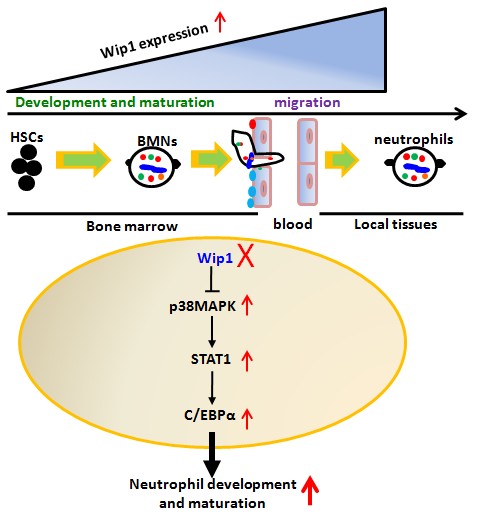赵勇研究组有关磷酸酶Wip1调控中性粒细胞发育分化的研究成果在Blood上发表
中性粒细胞在机体抗感染防御及自身损伤中均发挥重要作用。因此,维持中性粒细胞适度的内稳态具有十分重要意义。 野生型P53诱导的磷酸酶1( Wild type p53-induced phosphatase 1,Wip1 )由PPM1D(protein phosphatase magnesium-dependent 1 delta)基因编码。作为一种丝氨酸-苏氨酸蛋白磷酸酶,Wip1具有致癌性,在乳腺癌、恶性脑瘤、卵巢癌等中都检测到Wip1高表达,认为是一个未来开发抗癌药物的重要靶分子, 受到重视。 目前关于Wip1基因对中性粒细胞的作用未见报道。中科院动物所赵勇研究组与协和动物所张连峰研究组近期合作完成的研究结果表明,Wip1在中性粒细胞中高表达。应用Wip1基因缺失小鼠为实验模型研究发现,Wip1基因缺失导致小鼠骨髓与外周血中性粒细胞数目明显增多,表现为中性粒细胞增多症特点,并且细胞呈现超成熟状态,其吞噬功能和产生活性氧的功能也明显增强。体内和体外实验证明,Wip1内源性负向调控骨髓干细胞向中性粒细胞方向的定向发育分化。进一步分子机制研究证明,Wip1这种调节作用不依赖于p53信号通路, 而主要是通过负调控p38-STAT1-C/EBP信号通路来调节粒细胞的发育分化。Wip1负调控中性粒细胞的发育分化与成熟将为有效调控中性粒细胞分化提供了新靶分子,为相关疾病的治疗提供了新线索。
该研究成果于近期在Blood杂志上发表: Liu et al.,Phosphatase Wip1 negatively regulates neutrophil development through p38 MAPK-STAT1。 该项研究工作得到科技部国家重点基础研究发展计划、国家自然科学基金、中国科学院优秀青年人才专项的资助(原文链接)。

Wip1 maters the development and maturation of neutrophils.
Wip1 expression is gradually increased in neutrophils as its maturation from HSCs and migrating to circulation. At an early stage of development, Wip1 expression is maintained a lower level in progenitor cells of neutrophils, resulting in a low suppressive activity and high mobility of these cells. The increased Wip1 expression during neutrophils serves to prevent supermature phenotype of developing neutrophils in bone marrow. Wip1 controls the development and maturation of neutrophils via targeting the p38 MAPK-STAT1 signaling pathway. Wip1 mediated overall neutrophils effects is independent of p53 modulation. Other potential signaling pathways need to be determined.

